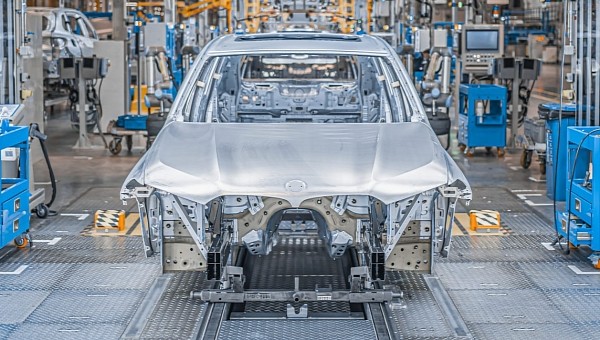The BMW Group has made yet another step in its strategy of reducing its CO2 emissions. Instead of attempting to further cut emissions of its vehicles, the German conglomerate has decided to ask its suppliers to provide CO2-reduced steel. This way, all the steel used for manufacturing in the U.S. and China will be one with a reduced carbon footprint.
In case you were unaware, steel is an massive source of CO2 emissions, both in the BMW Group's supply chain and in general for all branches of industry that require this material. With the latest contracts signed recently, the BMW Group will supply its global production network with over one-third of CO2-reduced steel from 2026.
BMW estimates that the carbon footprint of its supply chain will be reduced by 900,000 tons per year, while also being one of the drivers of transformation for the steel industry. The latter must change to cater to the needs of its customers, but if its customers do not ask for CO2-reduced steel, no company will manufacture it. Once it is requested by enough customers, it may become the norm.
Now, do not think that this steel is just for ICE vehicles, because it is not. In fact, about 20 percent of supply chain CO2 emissions for a mid-sized fully-electric vehicle come from steel, which is third on that vehicle's CO2 footprint after battery cells and aluminum.
The same applies to every other product in the range – whatever you select, there is a carbon footprint for it, and even your daily activities have a carbon footprint. According to scientists, there is even a carbon footprint for death, so there is no escape from taxes or carbon footprints.
In the U.S., the BMW Group has made agreements with domestic steel producers to use renewable energy sources in their local steel production. The agreements were signed with Steel Dynamics (SDI), and Big River Steel.
About half of the BMW Group's flat steel requirements in the U.S. and Mexico come from a process called electric arc furnace (EAF), which uses electric energy to melt down iron and steel scrap to make new steel.
When compared to a conventional blast furnace, this process has the potential to make further CO2 savings, especially because it is not coal-based, and it also produces steel that is particularly suitable for structural components, such as the underbody, which means that it delivers a higher strength steel than the conventional process, not just one with reduced CO2 emissions.
In China, the BMW Group has made a deal with the HBIS Group for the supply of CO2-reduced steel. Meanwhile, in Europe, the German conglomerate has deals with Salzgitter AG and H2 Green Steel for the supply of this CO2-reduced material.
BMW estimates that the carbon footprint of its supply chain will be reduced by 900,000 tons per year, while also being one of the drivers of transformation for the steel industry. The latter must change to cater to the needs of its customers, but if its customers do not ask for CO2-reduced steel, no company will manufacture it. Once it is requested by enough customers, it may become the norm.
Now, do not think that this steel is just for ICE vehicles, because it is not. In fact, about 20 percent of supply chain CO2 emissions for a mid-sized fully-electric vehicle come from steel, which is third on that vehicle's CO2 footprint after battery cells and aluminum.
The same applies to every other product in the range – whatever you select, there is a carbon footprint for it, and even your daily activities have a carbon footprint. According to scientists, there is even a carbon footprint for death, so there is no escape from taxes or carbon footprints.
In the U.S., the BMW Group has made agreements with domestic steel producers to use renewable energy sources in their local steel production. The agreements were signed with Steel Dynamics (SDI), and Big River Steel.
About half of the BMW Group's flat steel requirements in the U.S. and Mexico come from a process called electric arc furnace (EAF), which uses electric energy to melt down iron and steel scrap to make new steel.
When compared to a conventional blast furnace, this process has the potential to make further CO2 savings, especially because it is not coal-based, and it also produces steel that is particularly suitable for structural components, such as the underbody, which means that it delivers a higher strength steel than the conventional process, not just one with reduced CO2 emissions.
In China, the BMW Group has made a deal with the HBIS Group for the supply of CO2-reduced steel. Meanwhile, in Europe, the German conglomerate has deals with Salzgitter AG and H2 Green Steel for the supply of this CO2-reduced material.













